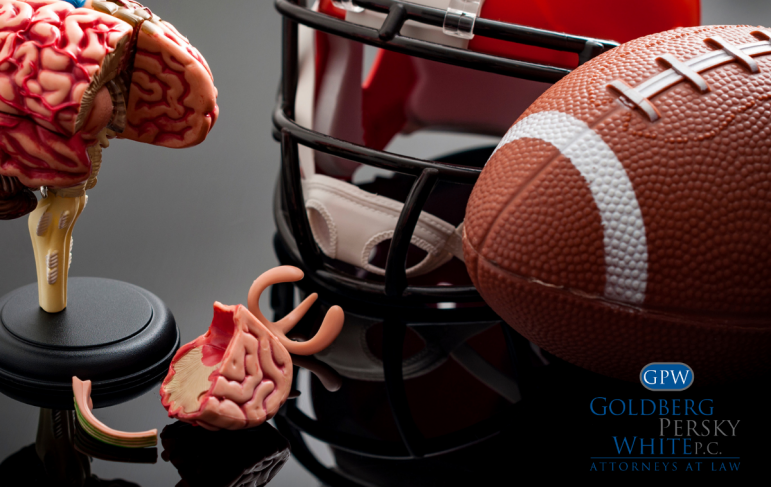Concussions and Traumatic Brain Injuries in Sports
We encourage children and adults to participate in sports and recreational activities for exercise, friendship, and to teach working together as a team. However, people don’t realize that a fall, tackle, or collision with another player can cause a blow to the head that results in a concussion or traumatic brain injury (TBI). The team, coaches, and sponsoring organizations should make sure players are cared for during athletic competitions. When they fail to do so, you may be able to seek damages to compensate you for medical expenses.
What Causes Concussions?
The brain floats within the skull which is surrounded by cerebrospinal fluid that provides a protective cushion. Although the skull protects the brain, it can’t absorb the full force of an impact. Sudden blows to the head, or even a rapid decline in speed when driving can cause a concussion. As the brain impacts against the inner wall of the skull, it can tear blood vessels, stretch nerve fibers, and bruise the brain.
Signs and Symptoms of Concussions
Signs and symptoms of concussions might not be immediately apparent. Symptoms can last days, weeks, or even longer. These may include:
- Headache or pressure in the head
- Temporary loss of consciousness, amnesia
- Confusion, fogginess, dizziness, or “seeing stars”
- Ringing in the ears
- Nausea, vomiting
- Slurred speech, delayed response to questions
- Fatigue
Traumatic Brain Injury
(ATBI) is defined as an impact on the head or a penetrating head injury that disrupts the brain’s normal function. TBI can if the head suddenly and violently hits an object or when an object pierces the skull and enters brain tissue. Symptoms of a TBI can be mild, moderate, or severe, depending on the extent of damage to the brain.
Approximately 5.3 million Americans are living today with disabilities related to traumatic brain injury. According to the International Brain Injury Association (IBIA), brain injuries are among the most likely to result in death or permanent disability. Brain injuries are the leading cause of seizure disorders, disability, and death.
Critical Effects of TBIs
- Cognitive Skills: Individuals with a moderate-to-severe brain injury typically experience problems with basic cognitive skills, such as sustaining attention, concentrating on tasks at hand, and remembering newly learned material. They may think, speak, and solve problems slowly. They may become confused when everyday routines are changed or when the stimulation level from the environment exceeds their threshold. They may persevere at tasks too long, unable to switch to a different tactic or a new task when encountering difficulties.
- Communication Problems: Individuals can have difficulty understanding speech or writing, be unable to organize thoughts or ideas, have trouble following a conversation, particularly with changes in tone or pitch, have difficulty starting or stopping conversations, use foul or inappropriate language, or be unable to use the muscles needed to form words.
- Mood or Behavior Disorders: Many emotional and behavioral problems are associated with TBI, such as depression, anxiety, anger, paranoia, agitation, confusion, frustration, mood swings, and sleep issues. Problematic behaviors might include aggression and violence, impulsivity, acting out, noncompliance, social inappropriateness, emotional outbursts, childish behavior, impaired self-control, impaired self-awareness, inability to take responsibility or accept criticism, and alcohol or drug abuse.
- Physical Conditions: Headache, nausea, vomiting, dizziness, blurred vision, sleep disturbance, weakness, sensory loss, spasticity, aphasia, dysphagia, dysarthria, apraxia, balance disorders, disorders of coordination, or seizure disorder.
When a concussion or brain injury results from another person’s carelessness, the victim has the right to seek compensation for their losses, including costs of therapy and rehabilitation, medical bills, lost wages, and other costs associated with short and long-term care.
Brain injury cases can be complicated and require significant documentation and witness testimony to prove fault. At Goldberg Persky and White P.C., we are experienced in brain injury cases can advise you of your rights and legal options. If you’re an athlete or parent of a child athlete, you owe it to talk to an experienced personal injury attorney. Contact us today!
Sources
Mayo Clinic Staff, “Concussion” Mayo Clinic (February 2020). [link]
Mayo Clinic Staff, “Traumatic Brain Injury” Mayo Clinic (February 2021). [link]




